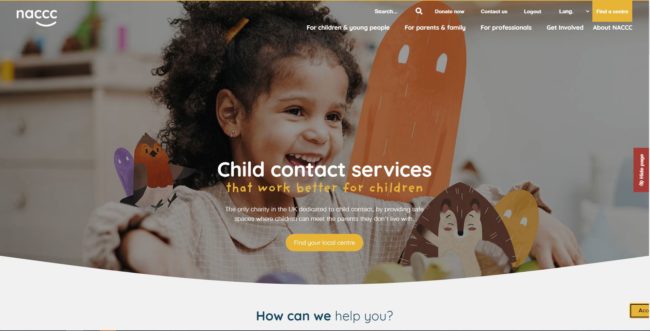We know that using a contact centre will be hard for you and for your children and it is something that you might have lots of questions or concerns about. We have tried to address some of the more common of these, here for you:

- My child is refusing/scared/unsure about going to a contact centre, what do i do?
- If my child is upset during contact will they be forced to continue?
- I’m not confident with my child’s care needs like nappies and feeding, will someone help?
- How long will we need to use a contact centre for?
- Have parents still be able to use contact centre’s during Covid?
- What has Covid changed about how I can use a contact centre?
- Can I take photos?
- How do centres help families move on?
- Will my ex be present when I see my children?
- With supervised contact, when will my notes be available?
- Will my new partner be able to come to the centre with me?
- The centre has said we are ready for contact in the community, how can I trust this will work?
- Are the centre staff impartial?
- Do contact centres have to abide by court orders?
- What are the qualifications of people running the service?
- Do staff and volunteeers have a DBS check?
I have been ordered by the court to use a child contact centre, but my child is refusing / scared / unsure etc about going, what do I do?
Preparing children for the use of child contact centres is key to the service going well. Children will be experiencing a wide range of feelings and emotions and these can be exacerbated by previous experiences of trauma for example. Children often do not have the capacity to understand these emotions, particularly when they are experiencing several emotions that seem to contradict one and other.
The parents that have children living with them are often well placed to take meaningful steps to prepare children for face to face contact. How this might look will vary from child to child and family to family, but typically it might include:
- Make it ok or better still encourage talk about contact and the other parent at home. Making something “ok” goes much further than saying it. Children must genuinely feel it.
- Children should have a safe place to be able to ask questions about contact and where possible these should be answered as positively as possible.
- Children might be helped to remember positive memories relating to the other parent, so that they are able to remember better times.
- Give your children photos of the other parent.
- Visit the NACCC website for more information.
- Take your child for a pre-visit at the centre so that they have information shared with them as a level they are able to make sense of.
- Childline also provide a free and confidential service to children who are worried. Often because they are strangers without emotional involvement, they are amazingly well placed to help children develop a sense of perspective and overcome some of the anxieties they may have. Let your child know, its ok to talk to Childline.
The key is that every child and every situation is different, and centres will have the skills to develop their responses to families to ensure they are supported in such a way that best meets their needs.
If my child is really upset during contact, will they be forced to carry on with the contact session?
If your child is really upset in a contact session the person, they are spending time with will be expected to be able to meet their needs and if needed they will be supported to calm your child. These are important skills that will be required if or when the service moves out of the centre. It is also important that your child builds a relationship and trust with the person they are spending time with so that this can be the initial stepping-stone towards allowing this parent to meet their needs.
However, there are some, very rare, occasions when children cannot be calmed, and this is neither the fault of the child or the person they are visiting at the centre. In this scenario it is possible that sessions will be bought to an end early. Child contact centres are there to ensure the safety of children, which includes their emotional wellbeing.
Initially, the centre might invite you to remain present in the centre. Possibly within a waiting room so that you can be there for your child if they become unsettled. Moving forward they will probably encourage you to be leaving the centre during contact, they will be able to call you to come back if you are needed.
I’m not confident with feeding and nappies, will someone help me?
At a supervised centre, it might be possible for a staff member to help you, or even to role model how to meet the basic care needs of your child. Where this is happening, it will always be because this is what is best for your child and will usually be because they are working with you to help you to gain the skills to do this independently.
At a supported centre, the people working there do not complete basic care tasks. The expectation would be that all parents using the service are competent at meeting all the needs of their children. Volunteers in supported centres will usually be happy to support you if you occasionally need this, but often this support would be limited to advice about how to meet your child’s needs and then you would independently act upon this.
If you have never changed a nappy, fed or winded a child before – talk to the centre about this. Don’t be embarrassed, there might be a way that they can support you. You definitely will not be the first or last parent that has worried about this.
How long will we need to use a child contact centre for?
Child contact centres should (almost) always be thought of as ‘short term stepping-stones’. In most cases a centre would plan to support your family for around 3 – 6 months. It is hoped that after this time the children’s parents will be able to work together to make arrangements that better meet the child’s needs.
Having said this, there are some (very rare) circumstances where a centre might be needed for several years. If you think this might be the case in your situation, why not contact the NACCC advice line on 0115 948 4557 or contact your nearest centre to discuss your situation.
Have parents still been able to use Contact Centre to see their children with Covid restrictions?
During the first lockdown many contact services temporarily ceased offering face to face services. Some closed their doors entirely whilst others took to offering an online service. Most are now back open and able to assist with anything you might need. If you would like to know what is happening in your local area the NACCC Website has a handy tool where you can enter your postcode and find out the status of contact services near where you (or your child) live.
How have Covid restrictions changed how contact can be delivered by centres?
You might notice some changes, these mostly relate to Social Distancing and (adults) wearing face coverings, but in essence most services won’t seem that different on the face of it. Child Contact Services have worked tirelessly to make sure that you have the most pleasant experience possible whilst also being safe. There is lots of information on the NACCC Website about how centres are achieving this. However, your local service would welcome the opportunity to talk you through anything you might want to know.
Can I take photos at the contact centre?
Once your referral has been accepted by the centre, both parties will be invited to a pre-visit. This is where the centre will go through their ground rules, and you will have the opportunity to discuss with them the use of cameras, mobile devices, and photographs while at the centre. The contact centre will have their own processes relating to this.
How do centres support families to move on?
Child contact centres work on the basis that they are providing a short-term stepping-stone in families’ lives. In most cases it should be expected that a centre will be needed for no more than 3-6 months, although this is obviously different for some families and for Looked After Children. Every case is assessed and planned for on an individual basis and centres are usually well placed to meet the needs of the families using their services.
Contact centres often have a review session where they consider the contact moving forwards. This could be from supervised contact to supported contact. Contact centres also offer handovers into the community. The young person can be signed into the centre on the register and then the contact person can take the young person out for the time of the contact session and then sign the person back in. This helps to build confidence before contact progresses without the centre.
The contact centre also provides parenting plans and these consider many areas of a young person’s welfare. This is a helpful tool to help the adults make informed decisions for the young person and how to safely move contact forwards. The parenting plan can be found on the NACCC website and it would be beneficial for every parent to have sight of one before contact commences.
Will my ex be present when I’m seeing my children?
Whilst you are in contact with your child it would not be usual for the other parent to be present. Often, they won’t be in the session with you, but they might wait in the waiting room. Otherwise, they might pop to the shops or find somewhere to buy coffee whilst they wait. The centre will always have a way to contact the person your children live with, so if support is needed it will never be too far away.
With Supervised Contact, when will contact notes be available?
The individual contact centre should be able to give you a time frame of when you can expect contact notes. Hopefully, the arrangements for sharing contact notes will have been made clear in the pre-visit meeting. The NACCC standards state the following:
“All records of contact should be completed and signed by the paid/unpaid staff responsible for supervising and recording the contact within two hours of it finishing wherever possible and within 48 hours at the latest. All contact records should be checked and co-signed by a senior worker/coordinator /centre manager before being sent to the appropriate parties.”
Can my new partner come into contact sessions with me?
Seeing your child at a contact centre is a very emotionally provocative event for you and your child. Initially, it is best if these sessions are used for you and your child to build and strengthen your relationships in this very unfamiliar environment.
In terms of the needs of your child it is worth remembering that a lot has changed in their lives recently, and maybe changes are still happening. This is likely to be very unsettling and hard to get used too, even if your child seems to be managing well. What children need is consistency and security. Therefore, it is usually best not to introduce them to new people that might make them feel insecure, until other elements of their lives feel a little more stable for them.
However, it might be possible for other people to attend child contact sessions with you after you have been using the service for some time. This will need to be discussed with the centre, prior to making any arrangements. You should not come to the centre with visitors without letting them know. Typically, they will want to seek the agreement of all parties before approving such requests.
If it is agreed, then your child can be introduced to new people, or people that they have not seen for a very long time. A supervised centre or Social Worker will be able to assist with planning this (re)introduction to ensure that this happens in the best way for the child. For most children, it is important that nothing is sudden or unplanned.
The centre has said that we are ready to move onto contact in the community – how can I trust that this will work out?
Moving on is often the hardest part. It is easy to feel safe at the centre, particularly once you have built a rapport with them. However, it is natural to be worried about the next step.
The centre will have worked with many families and supported them to move on. This experience provides them with a good basis to know what is best for your family. If you are worried talk to them, they might be able to set your mind at rest.
Are the centre staff impartial?
All NACCC accredited child contact centres and the people who work in them, will work with you impartially. They are very experienced and understand the difficulties that families will encounter.
Sometimes, the system can feel very unfair, depending upon your situation. It is worth considering that the centre has nothing to gain by taking sides and their first concern will always be the child’s best interests.
Do contact centres have to abide by court orders?
Orders made by the court usually provide instructions that are for parents to follow. Centres can be bound by court orders and most of the time they will do their best to work within them.
However sometimes, this will not be possible. For example, on occasions it can happen that the court will order a centre to provide a service that they do not offer, or to provide a service that they cannot offer within the timescales allocated.
Common instructions from the court to centres might include dates for reports or a specific number of sessions to be offered. Typically, centres do follow these instructions and this works well. However, there might be other occasions where to do so is not deemed to be in the child’s best interests or might even place them at risk. This could be because of changes in information or sometimes as a result of new information that the court didn’t know when they made the order. When this happens the centre would be expected to act in the best interests of the child and if this means not following a court order then steps would usually be taken to make the court aware of this.
Different centres and courts will have different processes for dealing with this. Often the courts and centres will have an arrangement when appropriate alternatives will be offered. On other occasions your legal representatives might have a mechanism to overcome this. It is also possible that you might need to return to court to get orders changed so that they can be followed.
What are the qualifications of the people delivering the service?
People do not need any particular qualifications to work as a Supported Child Contact Centre Co-ordinator, but co-ordinator training and annual safeguarding training will be mandatory once you start work. Co-ordinators will also need to complete the mandatory NACCC training programme. They will have appropriate qualifications and/or experience in working directly with parents or children. A knowledge of child development and good team-working skills would be helpful. Many supported child contact centres are open at weekends so the ability to work weekends and unsocial hours would be helpful.
For those working in a Supervised Child Contact Centre, undertaking supervision of contact, then people must be able to demonstrate that you have an appropriate vocational or academic qualification. The minimum requirement is an NVQ Level 3 in Child or Social Care with GSCE English and Maths Grade C or above.
Are staff members in centres disclosure and barring checked (DBS)?
Yes, all new volunteers, staff and trustees at a child contact centre accredited by NACCC need to have an enhanced disclosure from the Disclosure and Barring Service (DBS) before commencing work at the centre.
About the Author
Written by Philip Coleman – Service Development Manager at the National Association of Child Contact Centres (NACCC).
Phil is the Service Development Manager at NACCC following a career with the NSPCC, Local Authority Social Work, Looked After Children & Child Contact Centres. NACCC has been supporting children, families and child contact centres in terms of safe and effective child contact since 1991 and support in excess of 17,000 children a year.








